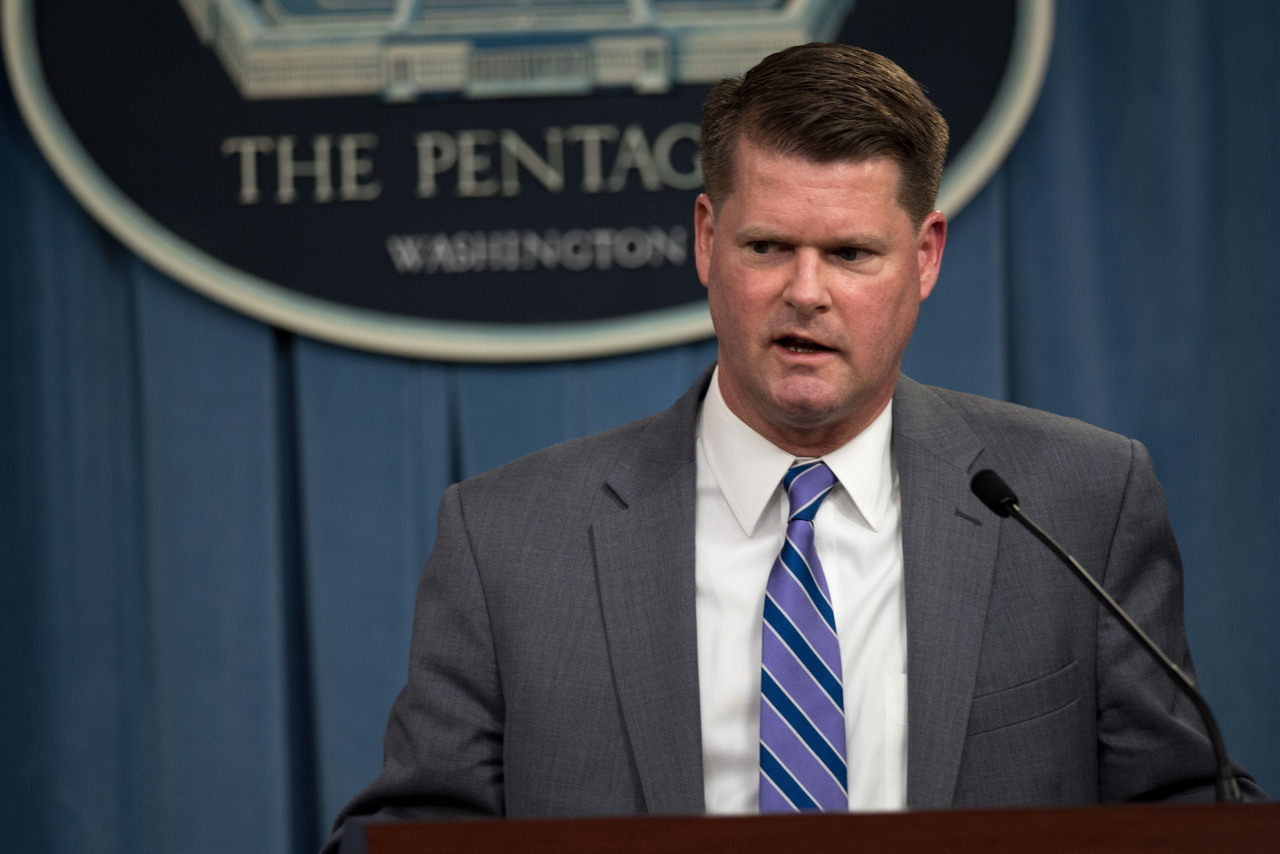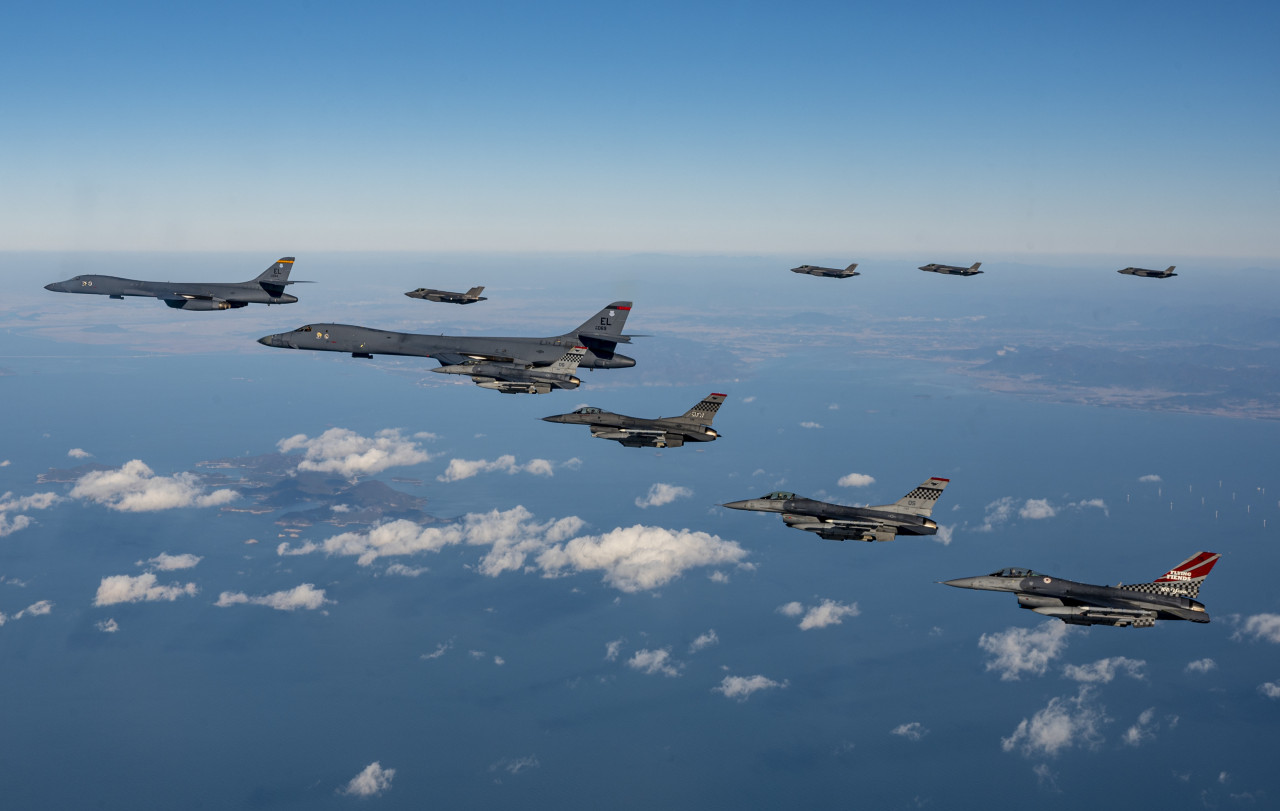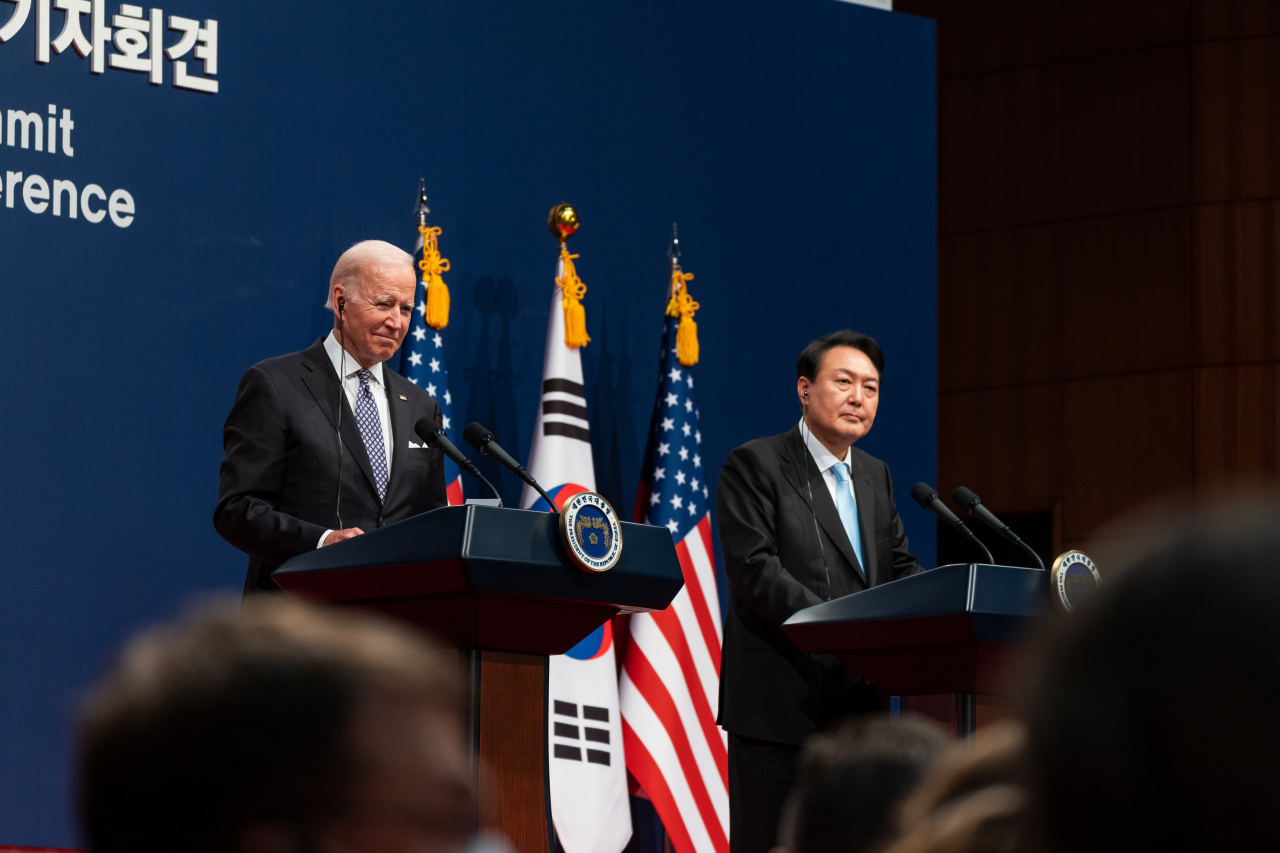[Herald Interview] Why and how should S. Korea, US retool alliance in face of China challenge?
Former top Pentagon official Randall Schriver says not at point of giving up hope for denuclearization of North Korea via diplomacy
By Ji Da-gyumPublished : Nov. 13, 2022 - 17:46

Schriver took note of the alliance’s imperative to focus on countering escalating and existential North Korean threats and to preserve deterrence on the Korean Peninsula.
But South Korea and the US should expand the scope of strategic focus to meet key shared challenges in the Indo-Pacific region, including the protection of sovereignty and free and open maritime commons -- waters navigable to all -- without overlooking the big picture. To that end, South Korea first needs to change its mindset and view the China challenge as a shared problem.
“South Korea itself will suffer if the maritime commons are squeezed and no longer free and open. My view is that South Korea shouldn’t say, ‘How we can help you, the US, with its problem;’ it should be, ‘how we help ourselves, given the shared problem,’” Schriver, chairman of the Project 2049 Institute and a former assistant secretary of defense for Indo-Pacific security affairs, said in an interview with The Korea Herald.
“When that’s the case, then we’ll see that we both have an interest in promoting the free and open qualities of the region. ... It’s a mindset change that we need to first have for a greater alignment on the nature of the problem.”
The alliance should evolve to adapt to the intricate security dynamics compounded by North Korea’s relentless nuclear buildup, China’s aggressive behavior, and Russia’s invasion of Ukraine, among others.
Schriver shared his views on how South Korea and the US can be postured to strategically and operationally confront and manage challenges posed by Pyongyang and Beijing, among others, in his conversation with The Korea Herald on Nov. 2 in the US capital Washington. The interview has been edited for length and clarity.
Prospects for denuclearized peninsula
The Korea Herald: Are South Korea and the US on the right track to achieve the objective of complete denuclearization of the Korean Peninsula? Or should the US and South Korea redirect North Korea policy?
Randall Schriver: It’s always been a low probability that North Korea would abandon its nuclear arsenal just through diplomacy. Even with a low probability, it’s worth sustaining that goal and worth working at it.
We’ve had to deal with the reality of having a deterrence posture to counter proliferation, even while we hold out some hope that there could be a process to persuade North Korea to abandon this program.
North Korea has to recognize that nuclear capabilities don’t make them more secure. Nuclear weapons bring risks to them, but North Korea is unwilling to see that despite our diplomatic efforts and economic sanctions.
KH: Do you believe that it is time to focus on deterrence?
Schriver: I am not saying this is an inflection point. The fact is that North Korea has had a nuclear capability since the early ’90s. We’ve had a de facto deterrence posture and we’ve talked about extended deterrence with South Korea for a long time.
The question is, do we give up hope for denuclearization through diplomacy? I don’t think we’ve reached that point. But I think we have sufficient evidence that it’s not going to be a quick or easy process.
KH: Some pundits claim that it is time to accept the reality that North Korea is a nuclear weapons state to manage tensions in the region. What is your take on that?
Schriver: My take is there’s a difference between political rhetoric and the reality of what we’re facing from a defense perspective.
The political rhetoric is still important because North Korea shouldn’t be allowed to run the illegal program, develop nuclear capabilities and then be recognized and declared as a nuclear state. That doesn’t help our Non-Proliferation Treaty. That doesn’t help us deal with other potential breakout countries. So in my view, we shouldn’t change our declaratory policy.
But there’s the reality that North Korea has a nuclear weapon, now has delivery systems and now may have the ability to marry those to the point of holding much of the US at risk, including the mainland of the US.
So these are all realities that can’t be wished away. So I don’t think it’s deterrence or denuclearization. I think it’s deterrence and denuclearization.

Allies’ deterrence posture against N. Korean, regional threats
KH: The US and South Korea have focused on enhancing the viability of US extended deterrence as the nature of North Korea’s nuclear and missile capabilities has significantly evolved. How can the US and South Korea recalibrate the US extended deterrence against evolving North Korean threats?
Schriver: Part of this is technical, requiring technical experts to sit down and talk about how the conflict would be handled ... making sure that both sides understand how decisions would be made and how our protections would be extended to South Korea when the conflict unfolds.
The other part of it is political and trust-building. That part of the adversary’s goal is to make South Korea believe it’ll be abandoned by the United States. For the United States, we need to continually reassure our ally that we are serious about extended deterrence and we are committed to defending South Korea, despite costs for us.
KH: But I’d like to touch upon the difference between South Korea and the US in terms of the alliance’s strategic objective in deterring posture. South Korea views North Korea as a major target of deterrence. But the US seems to view that deterrence should target broader regional threats, including China. So in your opinion, how can the US and South Korea bridge the difference in their strategic objectives?
Schriver: You can say our priorities are different. Our attention is divided. But we have a significant number of US forces on the peninsula that, in no way, could be insulated or removed from any conflict between the North and South. So we are fully committed to deterring North Korea.
I think the question is, does South Korea have the will, the intent and the understanding of how these things are interlinked? We have to deal with China because China is also a supporter of North Korea. So I would suggest you can’t look at them entirely in isolation, and I think we should work to achieve better alignment with South Korea on the greater China challenge as part of the overall problem.
KH: South Korea and the US have been updating their operational plan. Do you think the allies encompass China’s increasing military activities in and around the Korean Peninsula in their new operational plan?
Schriver: I think we should get to that point. I don’t think that that should be a forced or coerced discussion. I think the United States and South Korea need to work toward that through a consultative mechanism.
Retooling alliance to counter shared China challenge
KH: How do you assess the current military and security cooperation between the US and South Korea in meeting key challenges in the Indo-Pacific?
Schriver: The current US-South Korea alliance continues to be an alliance mostly focused on Korean Peninsula issues for understandable reasons.
The work that’s going on right now in the trilateral US-Japan-South Korea relationship is very important. Obviously, we’re still at a stage where we’re trying to repair and rebuild and gain trust. And that could be more than short term, but it’s important work because our alliances are increasingly regional and global in outlook, not just for the purpose of defending our ally.
Japan is taking a regional, global view, and so is Australia. The Quad, or Quadrilateral Security Dialogue (of the US, Japan, Australia and India), is an example. So, we’re better off if South Korea is a part of that effort to think of our alliances in a regional and global perspective. And at this point, it’s probably not there because of the need to focus so intently on the North Korean problem, but that’s where I believe we want to go.
KH: How can we step up trilateral security cooperation among the US, South Korea and Japan? How can we make it more sustainable in light of twists and turns in South Korea-Japan relations?
Schriver: What we’ve seen over the past couple of administrations is taking a very practical approach to specific problems -- missile defense and submarine warfare, for example.
That’s probably the best approach because that keeps military professionals focused on a problem set. When they do that, they look at the capabilities and tool kit and how to cooperate to optimize their defense posture. And that drives us to cooperate. We’re better as a trilateral grouping vis-a-vis North Korea than we are as two bilaterals. So I’m for keeping practical contingency planning as the center of this at least for now.
But over the long term, we should be working at something more trustworthy, more complimentary in terms of actioning our shared interests and appropriately accommodating the historical difficulties.

Schriver: The first part of your question was, “How can South Korea help the US with the China challenge?” We need to change the way we think about that.
The question should be, “How can South Korea help itself with the China challenge?” because, for example, South Korea has recently been victimized by Chinese sanctions over the THAAD (Terminal High Altitude Area Defense) issue. South Korea itself will suffer if the maritime commons are squeezed and no longer free and open.
My view is that South Korea shouldn’t say, “How we can help you, the US, with its problem;” it should be, “how we help ourselves given the shared problem.”
When that’s the case, then we’ll see that we both have an interest in promoting the free and open qualities of the region. Freedom of navigation should be a shared interest with other countries that are under stress and duress from Chinese coercion. That should all be a shared interest and a shared approach as far as I’m concerned.
It’s a mindset change that we need to first have for a greater alignment on the nature of the problem.
KH: Do you see the necessity to retool the South Korea-US alliance to better collectively respond to the China challenge?
Schriver: Yes, some of these regional challenges, including the protection of sovereignty, rule of law, international norms and the free and open qualities of the maritime commons -- all these things are things that we should be working on as an alliance, given what bandwidth is available.
Again, we have an obvious priority in dealing with North Korea and preserving deterrence. But over time, these other issues should have our attention as well.
Role in enhancing deterrence on Taiwan
KH: If a hypothetical Chinese invasion of Taiwan plays out, how can South Korea contribute to defending Taiwan?
Schriver: What we’ve seen in the Russia-Ukraine context is that cost imposition through economic sanctions and other measures have been an important part of the response.
South Korea, depending on the timing, may not be in a position to contribute militarily because of the North Korean threat. You can’t depart from that deterrence posture completely to deal with a regional contingency. But when you think about integrated responses, including economic and diplomatic ones, there are certainly ways that South Korea can contribute.
From time to time, our own posture on the Korean Peninsula has changed to meet other global requirements. During the Gulf War and the war with Iraq, for example, some of those forces came off the peninsula.
It’s quite possible that there would be a need for US Forces Korea to participate in some element of that. And so, through consultation, being able to do that is another way that South Korea could support us.
KH: Do you think South Korea and the US need to leverage their alliance to enhance deterrence of China’s aggression toward Taiwan? Do you think the allies should start a discussion over the matter?
Schriver: Of course, Yes. I don’t think it’s in South Korea’s interest for Taiwan to be taken over by China by force. That’s for Seoul to decide. That’s a sovereign decision. But if you agree that’s an outcome you wish to avoid, then, of course, South Korea should be part of the deterrence.
KH: In general, how can South Korea carve out its strategic path in the Indo-Pacific region, despite the growing pressure from China?
Schriver: It does take some willingness to take risks and understand that there might be a cost in terms of the positive atmosphere in the relationship with China.
But ultimately, China is not interested in seeing a strong, independent, prosperous South Korea that’s allied with democracies in the region. That’s not at all what they want to see. We know they want to see countries that are more deferential to their interest, and South Korea is no different than anybody else in that regard. When South Korea has faced coercion from China, it stood up quite admirably, like in the case of the THAAD response.
We should take lessons from that. South Korea does have the ability to withstand Chinese coercion. By the way, the last country to invade South Korea was not Japan. It was China.
____________
The Korea Herald conducted a series of interviews with former senior US officials and experts in Washington from Oct. 31 to Nov. 2 on the occasion of the 54th South Korea-US Security Consultative Meeting. The interviews cover a wide range of pending issues, including the prospects for a denuclearized peninsula, the alliance’s deterrent posture against North Korean and regional threats as well as South Korea’s strategic role in the Indo-Pacific region. -- Ed.








![[Graphic News] More Koreans say they plan long-distance trips this year](http://res.heraldm.com/phpwas/restmb_idxmake.php?idx=644&simg=/content/image/2024/04/17/20240417050828_0.gif&u=)
![[KH Explains] Hyundai's full hybrid edge to pay off amid slow transition to pure EVs](http://res.heraldm.com/phpwas/restmb_idxmake.php?idx=644&simg=/content/image/2024/04/18/20240418050645_0.jpg&u=20240419100350)






![[From the Scene] Monks, Buddhists hail return of remains of Buddhas](http://res.heraldm.com/phpwas/restmb_idxmake.php?idx=652&simg=/content/image/2024/04/19/20240419050617_0.jpg&u=20240419175937)

![[KH Explains] Hyundai's full hybrid edge to pay off amid slow transition to pure EVs](http://res.heraldm.com/phpwas/restmb_idxmake.php?idx=652&simg=/content/image/2024/04/18/20240418050645_0.jpg&u=20240419100350)

![[Today’s K-pop] Illit drops debut single remix](http://res.heraldm.com/phpwas/restmb_idxmake.php?idx=642&simg=/content/image/2024/04/19/20240419050612_0.jpg&u=)